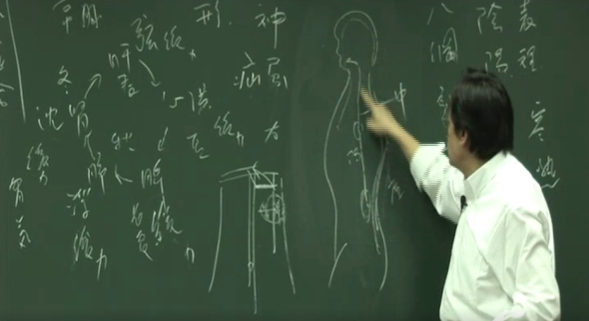
“Internal deprivation leading to fainting, voice hoarse as if useless,” here the term “useless” refers to loss of function, akin to discarded waste. This condition arises from “kidney deficiency, where the Shaoyin does not reach, resulting in fainting.” When the body’s energy is insufficient, especially when the kidney qi is deficient, symptoms of kidney deficiency will appear.
Kidney deficiency can be categorized into Yang deficiency and Yin deficiency, which we will analyze in detail later. In a state of kidney deficiency, the energy cannot rise, leading to an inability to produce sound. Normally, during inhalation, Yang qi enters through the direct pathway and is then exhaled.

However, it is important to note that the inhaled breath must undergo vaporization; only then can the body’s Yuan Yang, Zhen Yang, and Zhen Qi ascend along the spine. This is the unique pathway of Zhen Qi’s movement, which differs from our breathing method, and should not be confused.
To further distinguish between Yang deficiency and Yin deficiency, we need to focus on the changes in the essence of Yin and Yang.
When the kidney’s Yang is deficient, it can trigger a specific type of headache, with intense pain that can even affect the teeth. This is because Yang is above while Yin is below, creating a situation of excess above and deficiency below. When the lower part is Yang deficient, it is termed “deficiency.” In reality, Yang still exists, but its position has deviated too high, while Yin remains stagnant below, hence we call it Yang deficiency.
Yang deficiency often occurs after significant blood loss, such as vomiting blood or blood in the stool, with patients frequently exhibiting cold hands and feet, which aligns with the symptoms mentioned by Ni Haixia. The eyes, as the orifice of the kidneys, will be affected by Yang deficiency, potentially leading to vision impairment or even complete loss. Additionally, as Yang cannot control Yin, it may result in frequent urination that is uncontrollable, which is also a manifestation of Yang deficiency.
In the realm of the kidneys, Yin deficiency presents different symptoms. How do we determine Yin deficiency? Firstly, unlike the vision loss seen in Yang deficiency, patients with Yin deficiency may see colorful lights. Furthermore, as the kidneys open to the ears, individuals with Yin deficiency may initially experience tinnitus, which can progress to deafness. During Yin deficiency, the hands and feet remain warm, contrasting with the coldness seen in Yang deficiency.
In clinical practice, we can simply assess whether a patient has kidney Yang deficiency or Yin deficiency by observing their bowel movements. If a patient has normal bowel movements in the morning but experiences frequent bowel movements in the afternoon, this is often indicative of Yang deficiency. The assessment of Yin deficiency is relatively straightforward, as it can be preliminarily identified by observing the patient’s bowel habits and other bodily symptoms.
Regarding treatment, the kidney tonifying longevity formula mentioned by Teacher Ni Haixia is worth our attention. This formula can treat deficiency fatigue and has a significant effect on symptoms such as irritability and cold hands and feet.

The formula consists of eight herbs, including Gan Di Huang (Rehmannia glutinosa), Huai Shan (Chinese yam), and Shan Zhu Yu (Cornus officinalis). Gan Di Huang is chosen in its cooked form because its black color enters the blood aspect and can tonify the kidneys; Huai Shan strengthens the spleen; and Shan Zhu Yu enters the liver. These three herbs respectively nourish the kidneys, spleen, and liver, and their proportions are also significant.
So, under what circumstances is it suitable to take this kidney tonifying longevity formula?
If a patient has constipation, they may opt for Liu Wei Di Huang Wan (Six Flavor Rehmannia Pill); however, if they experience diarrhea, irritability, urinary issues, or difficulty urinating, they can use Gui Fu Ba Wei Wan (Cinnamon and Aconite Eight Flavor Pill). This formula is notably effective, especially for urinary problems, with rapid efficacy.
In summary, Traditional Chinese Medicine emphasizes dialectical treatment, and this is no exception in kidney tonification. Whether it is Yang deficiency or Yin deficiency, careful differentiation is necessary to select the appropriate formula for treatment. The kidney tonifying longevity formula and Gui Fu Ba Wei Wan, as mentioned by Teacher Ni Haixia, are valuable resources we can refer to in clinical practice.
Note: The above content is for health education purposes. If you have such symptoms that require adjustment, be sure to apply under the guidance of a professional doctor to avoid self-medication, which may delay the condition!
© Beijing Zhongfang Mingyi Clinic
Long press the WeChat QR code below for free consultation with professional TCM
WeChat ID|zfyy0030
[Disclaimer]: The content is sourced from the internet, and the copyright belongs to the original author. This article aims to promote positive energy in society and does not contain vulgar or negative guidance. If there are any copyright or personal infringement issues, please contact us promptly, and we will delete the content immediately! If there are any doubts about the events, please contact us for immediate deletion or modification.
